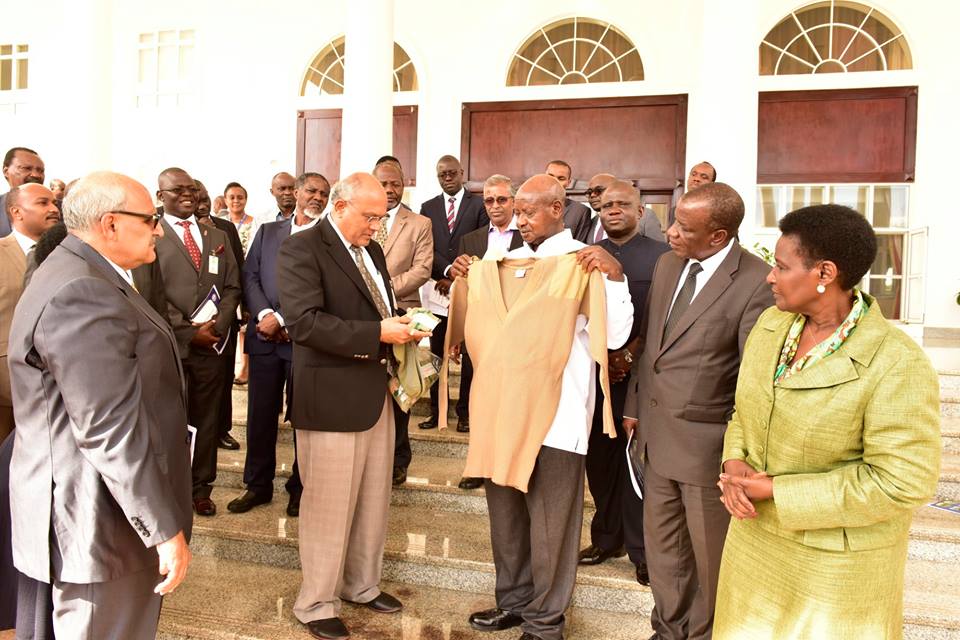
President Yoweri Museveni has said that the Government of Uganda will not allow any product that is locally produced in surplus quantities in Uganda to be bonded in the country Uganda.
“There should be no bonded warehouse for sugar or any other product that we have produced in abundancy in Uganda. The practice of bonding such products is due to corruption,” he explained.
President Museveni said that the Government would impose taxes on all imported goods once it is established that such commodities are produced in large quantities locally such as pharmaceutical and scholastic products.
The President made the remarks at State House, Entebbe when he received and met a delegation from the Uganda Manufacturers’ Association (UMA) that was led by its Chairperson, Barbra Mulwana and attended by Trade, Industry and Cooperatives Minister, Hon. Amelia Kyambadde, of Finance and Economic Development, Hon. Matia Kasaija and that of State for Privatization and Investment, Hon. Everlyne Anite.
The President’s remarks followed the manufacturers’ complaints over some Government officials who have frustrated the policy of Buy Ugandan Build Uganda, adding that those officials have persisted in procuring imported products even when there are good quality ones produced locally. Mr. Museveni made it clear that he would sack such Procurement Officers.
President Museveni explained that total demand is vital for businesses to progress. He told the meeting that the NRM Government is building roads, railways and expanding electricity generation and supply, among others, with the aim of reducing the cost of doing business in the country. He said that the Government is fully committed to the reduction in the cost of providing transport, electricity, bank loans, water and telecommunications for the benefit of all stakeholders.
He assured the UMA delegation that electricity rates would soon go down as Ayago power dam nears completion. He revealed that Uganda today generates electricity about 2,000 megawatts and that in the next 4 to 5 years, the country’s power generation will have been expanded to 5,000 megawatts. He added that plans are also underway to produce about 1,000 megawatts of electricity from geothermal energy.
President Museveni the UMA delegation that soon all industries, regardless of their size in operations, would enjoy a low rate of US5 cents per unit of electricity.
On communications, he disclosed that the railway link from Mombasa to Kisumu will soon be commissioned and that neighbouring Tanzania has also advanced in the extension of the railway from Dar-es-Salaam to Mwanza. He observed that given that progress, Uganda was assured of utilizing water transport to link with Kisumu and Mwanza at a low cost.
Mr. Museveni also told the meeting that Government has already provided funds to the Uganda Development Bank and plans underway to avail it with more funds so as to reduce the cost of commercial loans for industries. He added that the agricultural sector would also benefit from that line of credit. He was optimistic that under this arrangement, the cost of credit would further go down. He said given the opportunity that the harvesting of the oil resource would be soon be realized, the Government would establish an investment fund accruing from that sector.
Mr. Museveni concurred with the UMA delegation about the need to skill the available human resource. He informed them that Government has addressed the matter of skilling by facilitating the construction of technical institutes. He congratulated the UMA delegation for the reduction in the national import bill from US$7 billion to US$5billion per annum adding that Government policy is to ensure import substitution.
The UMA boss Ms. Barbra Mulwana, said manufacturers in the country face a number of challenges that range from high costs of doing business and capitalization.
A leading sugar producer, Abeid Alam, expressed pleasure to note that increased electricity generation will assure Uganda of more value addition to a host of products. He disclosed that Uganda has the potential to become a sugar production hub in the region.
